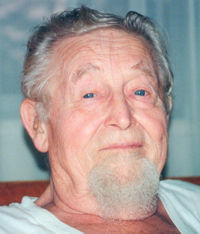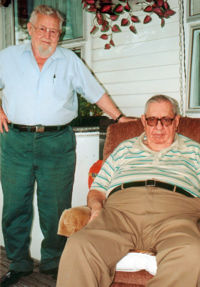The Life of Clarence Himes
Clarence Himes was born on February 10, 1921 at Saint Ann’s Hospital in Columbus, Ohio. He was the tenth child born to Walter and Anna Himes. In 1923 Anna died during childbirth at the age of 33, and her two newborns died with her. Alone, Walter was unable to care for his ten children because he was paralyzed along his entire left side. Clarence and his siblings were given to the care of family and the Children’s Home.
Clarence’s youth was a rough one. He was in and out of the Children’s Home. He grew up in the years between World War I and World War II, struggling through the great American Depression.
Clarence and his brother Walter spent their early years living with their Aunt Lulu Innis, but within two or three years they were sent to the Children’s Home when Clarence was six. At the Children’s Home Clarence did not see any of his other siblings except Walter. Ultimately, Walter became the only brother that Clarence ever knew. Other than Walter, the only thing Clarence knew about his other siblings was that one of his brothers was named John and one of his sisters was named Mary.
Although their father lived until c.1934, Clarence and Walter did not see much of him. He was in the hospital for twenty-two months with pneumonia of the spine when he died at the age of 54. The early death of his mother and consequent breakup of his family along with the distance from his father caused a lifelong feeling of abandonment in Clarence that forever forced him to contemplate the importance of a steady family.
Clarence’s formal education ended after the ninth grade. He was not an exceptional student, although he claimed to have done well in math. He enjoyed Algebra.
In the Children’s Home life was rough. As a boy, Clarence was small in stature. Some of the other boys picked on him. Sometimes Walter defended him, and sometimes a black friend named Harry Moor stuck up for him. But it wasn’t long before Clarence learned to take care of himself by fighting back. He became such a fighter that he was soon known as a tough kid. Once his reputation as a "hard ass” grew in the Home, others generally left him alone. But with his reputation came a price: much blame fell on his lap for offenses of other children.
Fights he didn’t start were blamed on Clarence. As Clarence later said, "It was pretty rough, and I had to do a lot of fighting—fist fighting in there. Got a lot of beatings, not from the guys, but from the supervision.” Often punished for the trespasses of other kids, Clarence started doling out revenge. When punished for the misbehavior of other kids, Clarence punished the perpetrators with a beating. This, of course, would bring down another punishment from the administrators, causing Clarence to be punished twice because of someone else’s offence. Clarence said that the administrators caught onto Clarence’s revenge tactics, so they would sometime punish Clarence so they could watch him trace down and expose the real perpetrator.
Clarence said, "When I was in the Children’s Home, there, the kids tried me out. So I let about three of them whip me without a fight. Then I decided, well, from then on, no one would whip me. So, [from then on], I whipped everybody who come along.”
His reputation as a tough kid. Once a cop stopped him on the street and said, "Ain’t your name Himes, Clarence Himes?”
Clarence replied, "What in the hell do you care?”
If Clarence seemed like a careless drifter, he still possessed one passion. To fight his small, pudgy stature, Clarence started gymnastics when he moved into the Children’s Home. His weight diminished as his love of the trapeze developed. He played on the bars as much as he could, which enhanced his muscles. His skills improved so much that his coach called the Ringling Brothers Barnum and Bailey Circus. The scout was impressed, and he spent the next six months training Clarence.
Clarence had trouble learning the kip, and after six months of unsuccessfully training Clarence, the trainer decided that Clarence would not be able to learn after all. The trainer left. Disgusted with himself, Clarence went to the bars and perfected the move in one day. The next day he showed this to the trainer. Amazed, the trainer asked how he had learned the move. Clarence said, "I learned to do it ‘cause you said I couldn’t.”
As he was a state ward, he was forbidden to join the circus. The state decided that he was too young to know what he should do with his life.
Clarence stayed at the Children’s Home until he was seventeen. Instead of just running away he told the superintendent that he was leaving. The superintendent told the supervisor to give Clarence shoes and pants, and Clarence took these. He stayed with his Aunt Lulu again, but he soon ended up going into the Three-C Camp.
Three-C Camp was an organization for eighteen-year-old boys to get jobs working in fields and on farms during the Depression years. Boys made fences for farmers, cut trees, put up fence posts, and did other various chores. Clarence did not stay long there because the administrators felt that he was too mean. He was honorably discharged, though there is a sense that the discharge was done only to appease Clarence and his strong sense of honor. Again he went back to his Aunt until he joined the Army on January 3, 1941 with his friend Bill Thacker.
The War Years
Clarence joined the 21st Regiment of the 24th Division and trained at Schofield Island, New York. His division took the Republican through the Panama Canal and on to Hawaii. There he stayed in the Schofield Barracks by Wheeler Airbase for 2½ years. Schofield was the largest US Army outpost outside the continental United States. When Pearl Harbor was bombed on December 7, 1941, Wheeler Airbase was also bombed. Clarence was there.
When the bombing started, he dove for cover under an Army truck. Clarence said that while he was under the truck, an old Hungarian cook notorious for his attitude sat at a nearby table, seemingly unshaken by the bombs. A bullet hit a cup of coffee, which spilled all over the cook’s table—the cook swore.
In 1943 he was shipped to Sidney, Australia. There he stayed for six to ten months of training, where Clarence and the other soldiers learned Judo. For the rest of his life Clarence liked to brag that he could take anyone down with that training, though he was always sure to say that although he could, he wouldn’t.
After Australia, Clarence and his division were shipped to Goodenough Island in the South Pacific. This was another training site, but this time it was called a "blood bath” because the fighting was real. There were Japanese soldiers on the island, and the two months that Clarence stayed there was an acclimation to actual battle. The real blood bath came in New Guinea. There, the US took three Japanese airfields.
Most of Clarence’s war stories are from the year he spent in New Guinea. One story is of Colonel Clifford, who marched his men continuously through the hilly jungle at a fast pace, passing up streams even after hours of exhausting hikes. The heat and humidity and mosquitoes were terrible. Clarence, who was a short man barely over five foot and four inches, had to work extra hard to keep up—for every step that a soldier of average height took, his legs had to take two. With the heavy equipment on their backs, the soldiers labored in the foreign jungles in misery.
After passing a number of creeks, the Colonel finally stopped the troops away from any source of water. The Colonel walked the line to view his men, and then returned to the front. The men were complaining about water, Clarence among them. But instead of grumble like the others, Clarence called out, "Colonel Clifford.” According to the rules, Clifford had a right to shoot Clarence for this because soldiers were forbidden to call the Colonel’s name and rank for fear of snipers. The Colonel immediately turned with his pistol in hand. Clarence was already aiming his rifle directly between the Colonel’s eyes. Clifford put the pistol back in the holster.
Clarence claims that before this incident the Colonel had displayed little respect for Clarence. He felt that Clifford hated Clarence, thinking that Clarence was a coward without any guts. After this incident, ironically, the Colonel treated Clarence with respect, almost as if Clarence were his own son.
An amusing story that illustrates Clarence’s tough-man attitude pertains to a time before his run-in with Colonel Clifford in the jungle. Clifford had punished Clarence for some offense by making him dig for seven days. Clarence’s Captain, a former lawyer, advised Clarence to dig a clump of dirt out of the ground, set it aside, and then put it back in the hole. Dig and dump, over and over. Clarence did so, and he spent seven days digging the same lump of earth out of the same small hole.
During combat one night, Clarence looked for cover in an old foxhole along a small embankment. Grenades were flying "like mad”, coming down like "snow drops.” While the combat was still heavy, something started creeping in the hole. Fearful of an enemy, Clarence clutched his knife and grabbed the intruder to cut the guy’s throat. But when he reached up, he realized that the ice-cold intruder was no human. Pulling his hand back, he saw that it was a large snake, probably a constrictor. The snake, which was as thick as Clarence’s leg, curled up beside him, soaking up his heat. Clarence spent the rest of the night shivering next to the snake, scared and cold.
In the morning, Clarence left the hole. He saw that the tree above the hole was as bare as a desert from grenades having knocked off every leaf.
During one patrolling round, Clarence and other men were scouting a river. They went up a small creek. When they became thirsty they drank from the creek. Upstream, they found three dead Japanese soldiers bleeding into the water.
In 1944 Clarence was shipped to San Francisco. On a train he departed for Canada to teach Judo to recruits, and then on down to Boston. He then transferred to North Carolina, followed by Arkansas. In June or July of 1944, he was discharged from the army in Indiana. He came back to Columbus and lived in a rooming house.
Jobs
After his discharge, Clarence got a job for Timken Roller Bearing as roller bearing press operator. The job was dangerous because the press could easily remove fingers and hands. As his skills improved he exceeded the rate setting. He made more bearings than he was supposed to in a competition with one of the other press operators. The set rate was 13,500 bearings per shift. The two reached around 20,000 bearings a shift when the other fellow cut off his thumb.
Clarence performed many different jobs in his lifetime. After the work he did in the Children’s Home, Three-C Camp, and in the army, he was a pinsetter in a bowling alley, a forklift operator and a common laborer. He laid floors and later worked as an assistant carpenter at the construction site of an atomic plant. He was also a dishwasher and a cook. The job that dominated his life, though, was his 34 years as an overheard crane operator for Buckeye Steel.
Marriage and Children
After the war Clarence joined a rooming house and he eventually found an opportunity to buy one for himself. One of his dreams was to make a place where he could home young, abandoned children; although that dream was never fulfilled, his rooming house was a step in that direction.
Among his tenants were Clifford and Avanel Barker, a couple a few years younger than Clarence. Avanel’s sister Anna Russell would occasionally visit the young couple. Clarence first met Anna in July of 1947 when Anna was staying with Avanel for a week. His first impression of her was that she was good looking and aggressive. He told himself to go ahead and take a chance courting her.
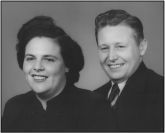 Over the first week they met a romance blossomed between Clarence and Anna, despite Anna’s first impression of Clarence: his clothes were never pressed and they lay all over his floor. But she found him handsome and fun. They were married by a Rabbi at no cost on August 25, 1947. Neither were Jewish.
Over the first week they met a romance blossomed between Clarence and Anna, despite Anna’s first impression of Clarence: his clothes were never pressed and they lay all over his floor. But she found him handsome and fun. They were married by a Rabbi at no cost on August 25, 1947. Neither were Jewish.
They enjoyed their time together traveling down to the hills of southern Ohio to visit her parents. They saw movies together. Their time together alone was limited, though, since Anna was soon pregnant. Their first child, Donna Marie, was born on May 20, 1948. Although she felt tied down, Anna was happy to have a child.
Clarence started classes at a school to become an accountant, but when Donna developed colic and cried for three months without reprieve, he found it too difficult to study. He quit.
His fondest memory, he said late in life, was that of Donna strolling down the sidewalk on her tricycle. She was two or three years old. He always remembered her as beautiful and happy.
Clarence Robert Himes, nicknamed Bobby, was born on May 4, 1950. He was an unhealthy Rh baby, but he was a happy boy who did not cry much. He needed constant medical attention, though, and the bills added up. Clarence was forced to work double shifts in order to pay for all the bills.
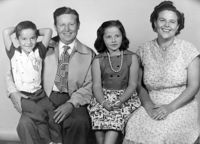 All the time spent at work kept Clarence away from his family. Anna did most of the nurturing, though there is no doubt that Clarence loved his children. Late in life he felt regret that his chief role had been the disciplinarian. In the future he would get to spend more quality time with his grandchildren, but that was not for many years. Clarence’s influence in the early childhood of his own children is hard to define since he spent most of his time out of the home working.
All the time spent at work kept Clarence away from his family. Anna did most of the nurturing, though there is no doubt that Clarence loved his children. Late in life he felt regret that his chief role had been the disciplinarian. In the future he would get to spend more quality time with his grandchildren, but that was not for many years. Clarence’s influence in the early childhood of his own children is hard to define since he spent most of his time out of the home working.
Religion
For most of his life Clarence did not think much about religion. He never doubted Christianity, and it probably always influenced him in unconscious ways. During childhood he had an experience that he would later describe as religious. He was climbing up a tall ladder to get to the second floor of the rooming house in which he was in when he fell from the top. His head hit the concrete sidewalk below, leaving a scar that never did completely fade away. As he lay helplessly on the street, obviously hurting, people continued to pass him without offering help. In pain and scared, Clarence was finally rescued by a very old, thin man. The man picked Clarence up and asked where he lived, then took the small boy home. Clarence never saw the man again. While there are numerous reasons why Clarence would never see the man again, he was convinced that this had been an act of angelic goodwill. Late in life, he said of this incident: "In my own honest opinion, that was a protecting angel. He was—he had to be.”
In the mid-70s Clarence got involved with an organized religion. He joined the World Wide Church of God, an organization under the leadership of evangelist Herbert Armstrong. From that time forward, the Bible and religion became increasingly important to Clarence. After the death of Herbert Armstrong and a few years of governmental changes in the World Wide Church of God, Clarence left for a splinter group called the Global Church of God. He stayed with that church until the end of his life.
These two churches were Judeo-Christian organizations that kept the traditional laws of the Old Testament. In this respect they resembled Judaism. But unlike Judaism, they believed that Jesus was the Son of God. Like many other Christian sects of the time, they believed that God would very soon come back to Earth to set up a New Kingdom. Armstrong set many dates for the return of Jesus, and they all passed without the return of Christ. Undaunted, the followers continued to have faith. Clarence never lost his faith. When he was near death, he looked forward to seeing his family again in the Kingdom of God.
For the last few years of his life Clarence spent time every day reading the Bible or other religious material. Somewhat discouraged by his lack of education, he made it a habit to look up each new word that he read. He often wrote the meanings of words in the margins of magazines or in one of his notebooks. If the definition had an unfamiliar word, he wrote that word and its definition as well. His desire to understand the will of God was deep.
Grandchildren
Clarence’s son Bob married Jacqueline Scheele on December 30, 1972. Jaci became pregnant, but their son was miscarried. Another pregnancy followed, and Robin Ann was born on March 15, 1974. Robin was premature. Chris Robert followed on August 21, 1976. Nikki Lynn was born on March 24, 1981.
Donna married Donald George Olson on November 26, 1975. Their first son Shawn Michael was born in Medina, North Dakota on January 2, 1977. After moving to Columbus, they had Faith Ann on January 17, 1979. Eric Matthew was born on June 11, 1982.
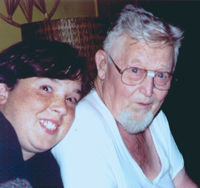 Clarence enjoyed all of his grandkids. Perhaps he wanted to make up for all the time he did not get to spend with his own children. He spent time wrestling with them, tickling them, teasing them. He would joke and horse around almost as if he was a small kid himself, and all the rough-house noise would sometimes get on Anna’s nerves.
Clarence enjoyed all of his grandkids. Perhaps he wanted to make up for all the time he did not get to spend with his own children. He spent time wrestling with them, tickling them, teasing them. He would joke and horse around almost as if he was a small kid himself, and all the rough-house noise would sometimes get on Anna’s nerves.
Clarence had thick fingernails and toenails. He kept them long and sharp to use as tools. They were like claws, and the children had fun (and a little pain) messing with them. When the family came around, there was plenty of laughing and happiness. After the roughhousing, Clarence would sneak back to his room and get into his cache of candy. He always brought out some wrapped hard candy for the children, usually butterscotch or root beer.
As time passed and Clarence got older, his body became too weak to play hard. Years of smoking combined with metallic dust from his industrial work had left him with emphysema, and he was short of breath. (He had given up smoking years in the past, but his lungs were still bad.) Slowly, unwillingly, he lost his ability to play heavily with his grandkids. By the time his first great grandchild came in 1995, he could barely hold the boy.
Ethan Michael Olson was born to Shawn Olson and Roxanne Gilbey on December 14, 1995. Although Clarence could not play with him much, he loved the little boy dearly.
Old Age
Clarence once said, "I don’t feel like an old man, but I am.” He was talking about his mind, because he was old and unhealthy. He survived prostrate cancer in the 1980s, though he never became completely healthy again. Stricken with arthritis, he could not heavily exert himself physically after retirement.
But he worked in the yard, picking up twigs, pruning flowers, and cutting apples. Anna kept a flower garden that delighted Clarence. Inside, he helped with the dishes and folding clothes. Every night, before bed, he sat out bowls and silverware for Anna’s breakfast the next morning.
He spent his time reading religious material, but this became strenuous on his eyes as the years passed. Sometimes he watched television, but most programs disgusted him. He was especially resentful for all the time viewers were compelled to spend watching commercials. He made a habit of counting the number of commercials that came on during a break. He always had something to say about it.
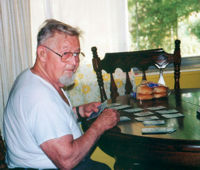 Everyone in the family would remember Clarence and his cards. He never seemed to bore of the game Solitaire, and he played the game tirelessly. When others were around, he liked to play Pinochle or Aggravation.
Everyone in the family would remember Clarence and his cards. He never seemed to bore of the game Solitaire, and he played the game tirelessly. When others were around, he liked to play Pinochle or Aggravation.
Clarence liked to talk about politics, about how America and government had gone downhill since the War. He felt that people were less friendly than when he was a kid. He was wont to say that in his youth he could greet a young lady on the street without any worry that she would yell, "Rape.” Doors didn’t need to be locked when he was young, he said. Politicians had ethics, then. Back then, a man could work and make a living: now a man could not support a family alone. Now, he said, there is no respect for anything, not even God.
While some of what he said was reasonable, some of it was silly. His fear of technology was almost paranoid. The Internet, something Clarence never once used or understood, was the end of civilization and freedom in his mind. He felt that crooks would use it to take everyone’s money and control their lives.
1998 was not a good year for Clarence. His body became weaker than ever, and his breathing was difficult. He could barely get any sleep at night because it was hard to breathe and his cramps and indigestion were getting worse. He went to church almost every week and lived as well as he could, but fate was against him.
In July he went to Doctor’s West hospital. His health was poor. Although he got well enough to come home for a while, it was not long before he was back in the hospital. This time he would never go home. His entire family was called in on Friday night, August 21, because the doctor felt that he might not make it through the night. It was an emotional night, but Clarence pulled through. He realized, though, that the time was near.
He said, "The doctors must think something is up if they called you all in like this.” No one told him his or her fears.
He died one week later in his chair at the hospital. His wife and daughter were both with him. It was a Monday afternoon, August 31, 1998, six days after his fifty-first wedding anniversary. He was seventy-seven years old. Everyone was sad to see him go, but relieved that his suffering was over. His final two days had been especially unbearable for him, and equally harsh on his family.
His funeral service was on September 3 at Schoedinger-Norris Chapel in Grove City, Ohio. He was buried that day in Forest Lawn Memorial Gardens on the east side of Columbus.
His Memory
On August 11, 1996, Clarence Himes sat down with his grandson Shawn to make a recording of Clarence’s life stories. They sat in the small bedroom in Clarence’s home at 3398 Reaver Avenue in Grove City. The recording was not high quality, and not all of their conversation was recorded. But it has Clarence’s voice and words, and it is now a cherished artifact of the family.
At the end Shawn asked, "Has life been good for you?”
"Yes,” said Clarence, "it’s been good, in a rugged sort of way. I won’t complain about it. I mean, I’ve always been, in years past, in better health than I ever dreamed. I didn’t know it ‘til I started losing my health—then I found out. But I want to be remembered mostly by you guys as loving. I want you guys to love everybody.
"I have no regrets. I guess I’m lucky. I never expected too much out of life, so I didn’t worry about it too much.
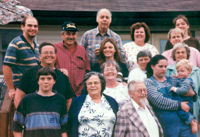 "I guess the love I want to be remembered by [is]—that you guys are united together as a family. A loving family, caring for each other—not just worrying about what somebody’s got better than you got—just love each other as a human being with feeling, not an attitude. As far as me being remembered, that’s mostly what I would like: [for] you guys to be joined together as a family, a soul family.
"I guess the love I want to be remembered by [is]—that you guys are united together as a family. A loving family, caring for each other—not just worrying about what somebody’s got better than you got—just love each other as a human being with feeling, not an attitude. As far as me being remembered, that’s mostly what I would like: [for] you guys to be joined together as a family, a soul family.
"If I was to pass away, I wouldn’t want nobody to be unhappy about it. Just remember the old slogan, I guess. Just love breeds love. Live with it. I guess that’s about all I can go on.”
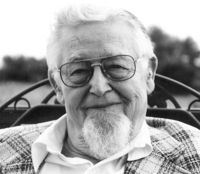 Clarence was born into a rough world. He never had a stable family while growing up. He lived through the American Depression and fought in World War II. He worked hard in everything that he did, and while he never became a great man to the world at large, he became a great man to his family. As the years passed so did some of his rough edges. By the end of his life, Clarence was devoted to love. His family meant everything to him. The tough street kid had become a frail, happy old man.
Clarence was born into a rough world. He never had a stable family while growing up. He lived through the American Depression and fought in World War II. He worked hard in everything that he did, and while he never became a great man to the world at large, he became a great man to his family. As the years passed so did some of his rough edges. By the end of his life, Clarence was devoted to love. His family meant everything to him. The tough street kid had become a frail, happy old man.
- Related Topics

